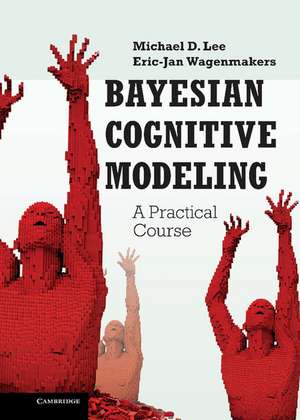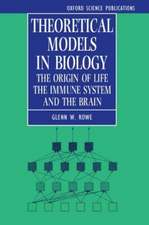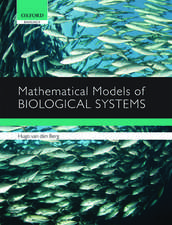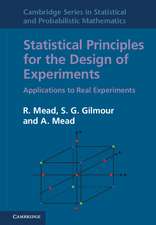Bayesian Cognitive Modeling: A Practical Course
Autor Michael D. Lee, Eric-Jan Wagenmakersen Limba Engleză Hardback – 2 apr 2014
| Toate formatele și edițiile | Preț | Express |
|---|---|---|
| Paperback (1) | 380.49 lei 6-8 săpt. | |
| Cambridge University Press – 2 apr 2014 | 380.49 lei 6-8 săpt. | |
| Hardback (1) | 752.96 lei 6-8 săpt. | |
| Cambridge University Press – 2 apr 2014 | 752.96 lei 6-8 săpt. |
Preț: 752.96 lei
Preț vechi: 875.53 lei
-14% Nou
Puncte Express: 1129
Preț estimativ în valută:
144.10€ • 149.88$ • 118.96£
144.10€ • 149.88$ • 118.96£
Carte tipărită la comandă
Livrare economică 14-28 aprilie
Preluare comenzi: 021 569.72.76
Specificații
ISBN-13: 9781107018457
ISBN-10: 1107018455
Pagini: 280
Dimensiuni: 178 x 254 x 17 mm
Greutate: 0.7 kg
Ediția:New.
Editura: Cambridge University Press
Colecția Cambridge University Press
Locul publicării:New York, United States
ISBN-10: 1107018455
Pagini: 280
Dimensiuni: 178 x 254 x 17 mm
Greutate: 0.7 kg
Ediția:New.
Editura: Cambridge University Press
Colecția Cambridge University Press
Locul publicării:New York, United States
Cuprins
Part I. Getting Started: 1. The basics of Bayesian analysis; 2. Getting started with WinBUGS; Part II. Parameter Estimation: 3. Inferences with binomials; 4. Inferences with Gaussians; 5. Some examples of data analysis; 6. Latent mixture models; Part III. Model Selection: 7. Bayesian model comparison; 8. Comparing Gaussian means; 9. Comparing binomial rates; Part IV. Case Studies: 10. Memory retention; 11. Signal detection theory; 12. Psychophysical functions; 13. Extrasensory perception; 14. Multinomial processing trees; 15. The SIMPLE model of memory; 16. The BART model of risk taking; 17. The GCM model of categorization; 18. Heuristic decision-making; 19. Number concept development.
Recenzii
'This book provides the best practical guide to date on how to do Bayesian modeling in cognitive science.' Jay Myung, Ohio State University
'This is a very powerful exposition of how Bayesian methods, and WinBUGS in particular, can be used to deal with cognitive models that are apparently intractable. When we produced WinBUGS, we had no idea it could be used like this - it's amazing and gratifying to see these applications.' David Spiegelhalter, Winton Professor for the Public Understanding of Risk, Statistical Laboratory, Centre for Mathematical Sciences, Cambridge
'This is a very powerful exposition of how Bayesian methods, and WinBUGS in particular, can be used to deal with cognitive models that are apparently intractable. When we produced WinBUGS, we had no idea it could be used like this - it's amazing and gratifying to see these applications.' David Spiegelhalter, Winton Professor for the Public Understanding of Risk, Statistical Laboratory, Centre for Mathematical Sciences, Cambridge
Notă biografică
Descriere
Using a practical, hands-on approach, this book will teach anyone how to carry out Bayesian analyses and interpret the results.













